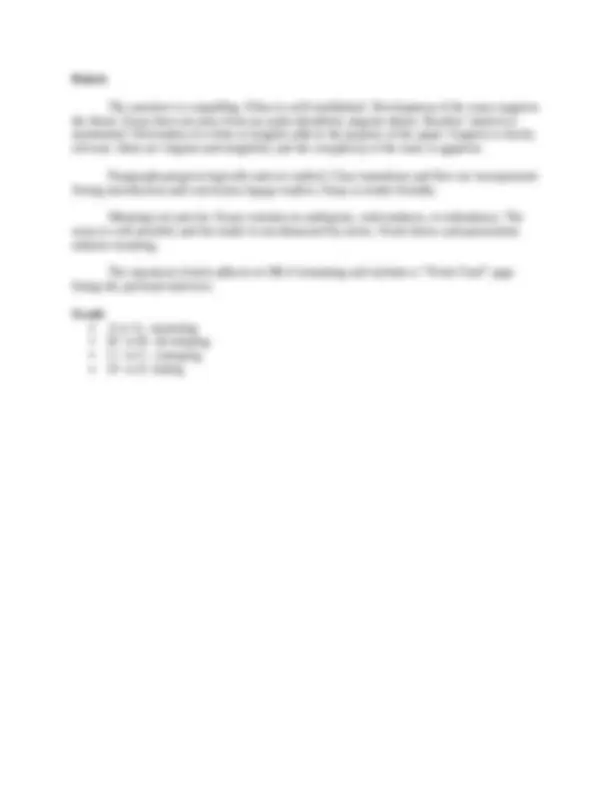



Study with the several resources on Docsity

Earn points by helping other students or get them with a premium plan


Prepare for your exams
Study with the several resources on Docsity

Earn points to download
Earn points by helping other students or get them with a premium plan
Community
Ask the community for help and clear up your study doubts
Discover the best universities in your country according to Docsity users
Free resources
Download our free guides on studying techniques, anxiety management strategies, and thesis advice from Docsity tutors
values essay for persuasive writing
Typology: Thesis
1 / 2

This page cannot be seen from the preview
Don't miss anything!


Values Essay You will interview a family member, mentor, or close friend with a different perspective than your own on how a significant life decision was made (such as educational/career choices, marriage or family choices, lifestyle choices, religious choices, etc.) You will analyze the information given in the interview in order to discover the core, motivating value (or fear) that has driven the interviewee’s decision. After completing the interview and analysis, you will write a three- to four-page essay describing how that person’s experiences led to and have shaped his or her values relative to that choice. The essay should focus on a single thesis and should be approached as an academic work. The most effective narratives select a few experiences and insights that tie back to the motivating value or fear. Effective essays for this assignment are tightly focused on how the interviewee developed his or her perspective. The essay should NOT simply be a summary of experiences (a “life history”) nor a survey of the many ways in which they exemplify their value today. Both direct quotations and paraphrases from the interviews themselves are welcome, but students can also share insights and experiences they are aware of that did not come up in the interview. Your audience is your teacher and classmates. You will have a correctly formatted Work Cited page at the end of the argument (not included in the page length). This essay (unlike future argument papers) will not include a cover sheet. Thesis: A thesis for this paper could be as simple as “So-and-so’s value was self- reliance.” The value (or fear) should be clearly stated somewhere in the introduction (which should be the first two paragraphs) so your paper can then be “tightly focused” and “thesis- driven.” How much “me” should be in the essay: This essay is not about you—it’s entirely about the other person. The point of the essay is to put yourself in the person’s shoes and focus on them to “describe how that person’s experiences led to and have shaped his or her values relative to [their] choice.” You will probably talk about yourself a little when you introduce the point of disagreement in the introduction. Do your best: In a way, it can be seen as presumptuous to “decide” what someone’s motivating value was for a major life decision. But you can analyze without pretending to be all- knowing. This paper is an exercise in analyzing someone’s values: an activity which is imperfect but necessary, anytime you are writing to a target audience. Interview: I recommend you take notes during the interview. Some students even choose to record the interview to help them catch direct quotes to put in their paper. What you do is up to you—you won’t be turning any notes in to me. Style: 12pt font, Times New Roman, double-spaced, MLA formatting, correct header and page number. The page length refers to full pages, so a two-and-a-half-page paper is not long enough.
Rubric The narrative is compelling. Ethos is well established. Development of the essay supports the thesis. Essay does not stray from an easily identified, singular theme. Readers’ interest is maintained. Description of events or insights adds to the purpose of the paper. Support is clearly relevant. Ideas are original and insightful, and the complexity of the issue is apparent. Paragraphs progress logically and are unified. Clear transitions and flow are incorporated. Strong introduction and conclusion engage readers. Essay is reader friendly. Meanings are precise. Essay contains no ambiguity, awkwardness, or redundancy. The essay is well proofed, and the reader is not distracted by errors. Word choice and punctuation enhance meaning. The argument closely adheres to MLA formatting and includes a “Work Cited” page listing the personal interview. Grade A to A-: mastering B+ to B-: developing C+ to C-: emerging D+ to E: failing